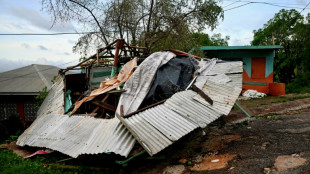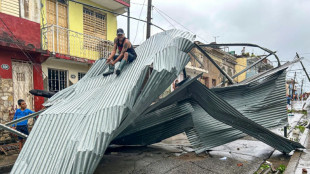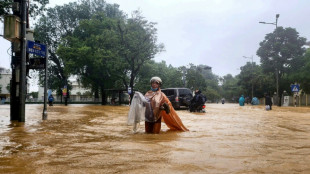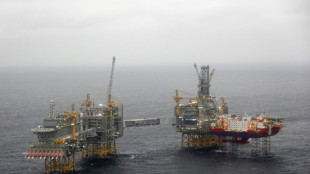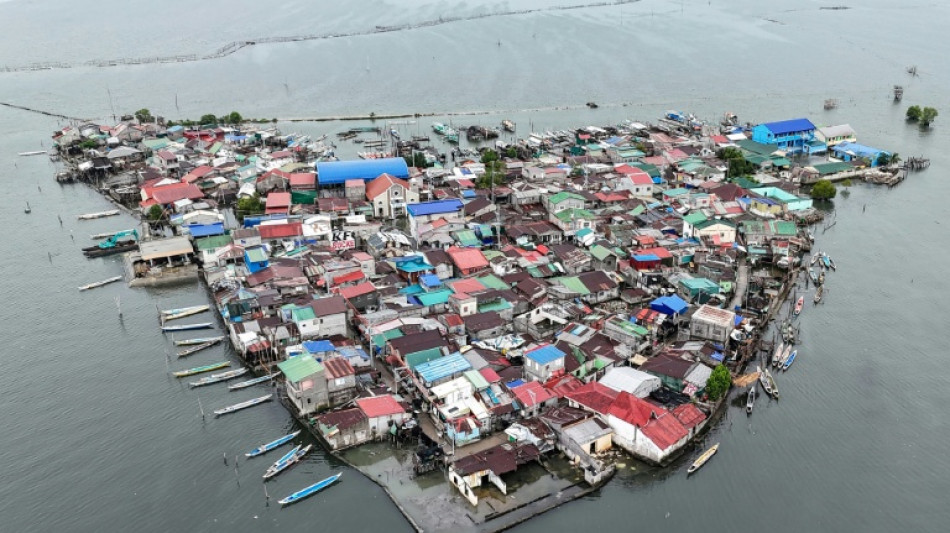
-
 India's Iyer says 'getting better by the day' after lacerated spleen
India's Iyer says 'getting better by the day' after lacerated spleen
-
Yesavage fairytale carries Blue Jays to World Series brink

-
 Bank of Japan keeps interest rates unchanged
Bank of Japan keeps interest rates unchanged
-
Impoverished Filipinos forge a life among the tombstones

-
 Jokic posts fourth straight triple-double as Nuggets rout Pelicans
Jokic posts fourth straight triple-double as Nuggets rout Pelicans
-
UN calls for end to Sudan siege after mass hospital killings

-
 Teenage Australian cricketer dies after being hit by ball
Teenage Australian cricketer dies after being hit by ball
-
As Russia advances on Kupiansk, Ukrainians fear second occupation

-
 Trade truce in balance as Trump meets 'tough negotiator' Xi
Trade truce in balance as Trump meets 'tough negotiator' Xi
-
China to send youngest astronaut, mice on space mission this week

-
 Yesavage gem carries Blue Jays to brink of World Series as Dodgers downed
Yesavage gem carries Blue Jays to brink of World Series as Dodgers downed
-
With inflation under control, ECB to hold rates steady again

-
 Asia stocks muted with all eyes on Trump-Xi meeting
Asia stocks muted with all eyes on Trump-Xi meeting
-
Personal tipping points: Four people share their climate journeys

-
 Moto3 rider Dettwiler 'no longer critical' after crash: family
Moto3 rider Dettwiler 'no longer critical' after crash: family
-
US economy in the dark as government shutdown cuts off crucial data

-
 Trump orders nuclear testing resumption ahead of Xi talks
Trump orders nuclear testing resumption ahead of Xi talks
-
'Utter madness': NZ farmers agree dairy sale to French group

-
 Samsung posts 32% profit rise on-year in third quarter
Samsung posts 32% profit rise on-year in third quarter
-
30 years after cliffhanger vote, Quebec separatists voice hope for independence

-
 Taxes, labor laws, pensions: what Milei wants to do next
Taxes, labor laws, pensions: what Milei wants to do next
-
South Sudan's blind football team dreams of Paralympic glory

-
 US says 4 killed in new strike on alleged Pacific drug boat
US says 4 killed in new strike on alleged Pacific drug boat
-
What we do and don't know about Rio's deadly police raid

-
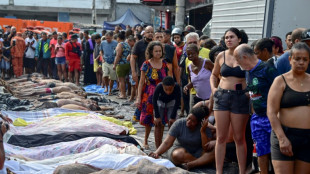 'They slit my son's throat' says mother of teen killed in Rio police raid
'They slit my son's throat' says mother of teen killed in Rio police raid
-
Arteta hails 'special' Dowman after 15-year-old makes historic Arsenal start

-
 Google parent Alphabet posts first $100 bn quarter as AI fuels growth
Google parent Alphabet posts first $100 bn quarter as AI fuels growth
-
Underwater 'human habitat' aims to allow researchers to make weeklong dives

-
 Maresca slams Delap for 'stupid' red card in Chelsea win at Wolves
Maresca slams Delap for 'stupid' red card in Chelsea win at Wolves
-
'Non-interventionist' Trump flexes muscles in Latin America

-
 Slot defends League Cup selection despite not meeting 'Liverpool standards'
Slot defends League Cup selection despite not meeting 'Liverpool standards'
-
'Poor' PSG retain Ligue 1 lead despite stalemate and Doue injury

-
 Liverpool crisis mounts after League Cup exit against Palace
Liverpool crisis mounts after League Cup exit against Palace
-
Kane scores twice as Bayern set European wins record

-
 Radio Free Asia suspends operations after Trump cuts and shutdown
Radio Free Asia suspends operations after Trump cuts and shutdown
-
Meta shares sink as $16 bn US tax charge tanks profit

-
 Dollar rises after Fed chair says December rate cut not a given
Dollar rises after Fed chair says December rate cut not a given
-
Google parent Alphabet posts first $100 bn quarter as AI drives growth

-
 Rob Jetten: ex-athlete setting the pace in Dutch politics
Rob Jetten: ex-athlete setting the pace in Dutch politics
-
Juve bounce back after Tudor sacking as Roma keep pace with leaders Napoli

-
 Favorite Sovereignty scratched from Breeders' Cup Classic after fever
Favorite Sovereignty scratched from Breeders' Cup Classic after fever
-
Doue injured as PSG held at Lorient in Ligue 1

-
 Leverkusen win late in German Cup, Stuttgart progress
Leverkusen win late in German Cup, Stuttgart progress
-
Jihadist fuel blockade makes life a struggle in Mali's capital
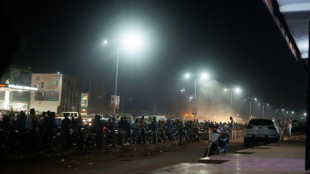
-
 Uber plans San Francisco robotaxis in Waymo challenge
Uber plans San Francisco robotaxis in Waymo challenge
-
Paramilitary chief vows united Sudan as his forces are accused of mass killings
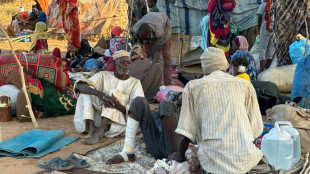
-
 Trump, Xi to meet seeking truce in damaging trade war
Trump, Xi to meet seeking truce in damaging trade war
-
Divided US Fed backs second quarter-point rate cut of 2025

-
 'Amazing' feeling for Rees-Zammit on Wales return after NFL adventure
'Amazing' feeling for Rees-Zammit on Wales return after NFL adventure
-
'Cruel' police raids help, not hinder, Rio's criminal gangs: expert


Against the tide: Filipinos battle rising sea on sinking island
On the Philippine island of Pugad, street food vendor Maria Tamayo wakes before her grandchildren to begin the backbreaking work of removing seawater from her home scoop by scoop with a plastic dustpan.
The routine has been the same ever since the rising tides of Manila Bay began swallowing the island -- a seven-hectare speck of land in danger of sinking completely underwater.
"Scooping water takes a long time. That's why my feet have started aching," the 65-year-old said, adding that she can spend up to three hours a day at the task.
"I have to scoop out the water before my grandchildren wake up, or else they'll slip on the floor. But it's no use … there's still water."
Tamayo is one of 2,500 people living in Pugad's only village.
The island is not the only one at risk in coastal Bulacan. Parts of the province are sinking at a rate of almost 11 centimetres (4.3 inches) a year, the fastest in the Philippines, according to a study led by geologist Mahar Lagmay.
The gradual sinking, known as land subsidence, is an "alarming" phenomenon caused by the overextraction of groundwater, and exacerbated by rising sea levels due to global warming, Lagmay said.
"The rates of subsidence (on Pugad Island) are quite high," he said, adding that while studies specific to the tiny island were lacking, existing data on surrounding areas told the story clearly.
With high tides flooding the streets at least three times a week, the sea already dictates the rhythm of daily life on Pugad.
Class schedules are adjusted daily based on tide charts to prevent children from contracting flood-borne diseases.
Homes have been raised on stilts to keep floors dry, while small business owners use high tables to keep their wares above murky water that can rise to 1.5 metres (five feet) on heavy flooding days.
- 'Back to normal' impossible -
Sea levels across the Philippines are already rising three times faster than the global average of 3.6 millimetres per year, and the Department of Environment and Natural Resources (DENR) has said this could accelerate to 13 millimetres annually.
"Sea level rise is being experienced in many parts of the country," DENR geosciences chief Karlo Queano told AFP, warning coastal areas could disappear without large-scale intervention.
While piecemeal efforts are in place in some areas -- groundwater extraction has been banned in parts of Bulacan since 2004 -- a broad national strategy has yet to take shape.
A government study on the path forward was not expected until 2028, Queano said.
"I think it's already impossible for our lives in the village to go back to normal because of climate change," said Pugad village captain Jaime Gregorio.
Gregorio said roads were being raised every three years to keep the community viable, but leadership changes meant the implementation of long-term flood mitigation projects was rarely consistent.
For Tamayo, who has lived on the island her whole life, the constant adjustment to the tide has drained what little money her family has scraped together.
Since 2022, they have been elevating their house each year, adding more gravel and concrete to stay above water, so far spending 200,000 pesos ($3,500).
"I love this island so much, this was where my mom and dad raised me... but sometimes, I think about leaving because of the high tide," Tamayo told AFP.
Her boatman husband, Rodolfo Tamayo, insists their livelihood depends on staying.
"We can't go to [other places], we won’t have jobs there. We will go hungry."
Lagmay, the geologist, said land subsidence could be reversible with effective government policies governing the over-digging of wells.
But addressing the rise of sea levels was impossible without a concerted effort by the world's highly industrialised countries to reduce greenhouse gas emissions, he said.
A UN climate fund established in 2023 to help countries like the Philippines address damage caused by climate change, meanwhile, remains unimplemented.
"We are talking of climate justice here. We have very little contribution to climate change, but we are very affected by its adverse effects," said Elenida Basug, the DENR's climate change service director.
Crouching in the doorway of her flooded home, Tamayo urged the world's polluters to take responsibility for what she and her neighbours were experiencing.
"We are the ones who are suffering... They are rich, so we cannot do anything. Even if we speak against them, who would listen?" Tamayo said.
R.Flueckiger--VB

